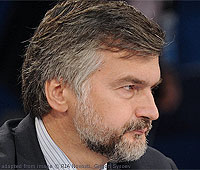Klepach says state investment in innovation key to fast growth
BusinessNewEurope - bne.eu - 4.16.12 - JRL 2012-70
Deputy economy minister Andrei Klepach says high growth would only be achieved with state investment in innovation, education, health and infrastructure requiring external borrowing, according to media.

file photoKlepach repeated the Economy Ministry's calls for Russia to run a 1.5-2% deficit and allow sovereign debt to rise to 25% of GDP through 2030 in order to achieve structural change and increase the share of technology and innovation in the economy relative to the resource sector, claiming this was the only way to achieve high growth rates.
GDP would increase 4.2% on average by 2030 if the state borrows to invest in hi-tech, innovation, computerization, education, health and infrastructure. In the event that the current reliance on the oil and gas revenues continues, GDP will grow by 3.5-3.6% on average, according to Klepach.
According to Klepach, the innovation and technology path would result in the share of innovation, technology and engineering in the Russian economy growing from the current 11% to 20%, and the share of oil and gas falling from the current 20% to 10%.
Klepach said to achieve this, the state would need to run a 1.52% deficit and public borrowing to rise to 25% of GDP. This is however bitterly resisted by the Finance Minister, and has also been dismissed by president elect Vladimir Putin. Economists calculate that Russia would an 8% of GDP budget deficit if oil prices dropped to $60 a barrel, as they did briefly in 2008-2009.
"It is worth noting that the ministrys optimistic oil price forecast sees crude rising to $226/bbl in 202630," write Aton analysts. "The sensitivity of Russian economic growth to rising oil prices is much lower than to declining prices. Appreciation of the domestic currency, which accompanies a rising oil price, is likely to negatively affect the competitiveness of Russian manufacturing, making the economy more dependent on imports," concludes Aton.
Klepach also predicted further global economic crises in 2016-2017 and 2025.
Keywords: Russia, Economy, Business, Investment - Russian News - Russia
Deputy economy minister Andrei Klepach says high growth would only be achieved with state investment in innovation, education, health and infrastructure requiring external borrowing, according to media.

file photoKlepach repeated the Economy Ministry's calls for Russia to run a 1.5-2% deficit and allow sovereign debt to rise to 25% of GDP through 2030 in order to achieve structural change and increase the share of technology and innovation in the economy relative to the resource sector, claiming this was the only way to achieve high growth rates.
GDP would increase 4.2% on average by 2030 if the state borrows to invest in hi-tech, innovation, computerization, education, health and infrastructure. In the event that the current reliance on the oil and gas revenues continues, GDP will grow by 3.5-3.6% on average, according to Klepach.
According to Klepach, the innovation and technology path would result in the share of innovation, technology and engineering in the Russian economy growing from the current 11% to 20%, and the share of oil and gas falling from the current 20% to 10%.
Klepach said to achieve this, the state would need to run a 1.52% deficit and public borrowing to rise to 25% of GDP. This is however bitterly resisted by the Finance Minister, and has also been dismissed by president elect Vladimir Putin. Economists calculate that Russia would an 8% of GDP budget deficit if oil prices dropped to $60 a barrel, as they did briefly in 2008-2009.
"It is worth noting that the ministrys optimistic oil price forecast sees crude rising to $226/bbl in 202630," write Aton analysts. "The sensitivity of Russian economic growth to rising oil prices is much lower than to declining prices. Appreciation of the domestic currency, which accompanies a rising oil price, is likely to negatively affect the competitiveness of Russian manufacturing, making the economy more dependent on imports," concludes Aton.
Klepach also predicted further global economic crises in 2016-2017 and 2025.